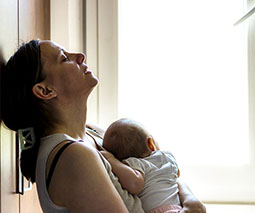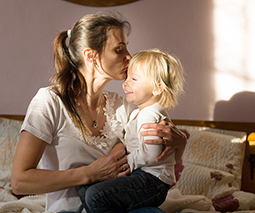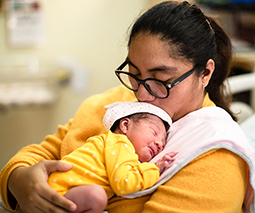Parenting through a crisis: How to build your resilience toolkit

Children can make life challenging at the best of times; in the worst of times, the responsibility can be overwhelming. So when life throws you curveballs, in the face of tragedy or crisis, the realisation that you also need to look after your little ones at the same time can be incredibly daunting.
Building your motherhood resilience toolkit
Mending a broken heart, grieving over the death of a loved one, losing a house, facing illness, moving to a new country. Whatever shape the crisis that befalls you, as a parent you need a plan to help you rebuild your faith in the world and remind yourself that, despite what has happened, the world is a safe and joyful place to raise your child.
Journalist and author, Amy Molloy, calls this building your ‘motherhood resilience toolkit’.
In a recent podcast interview with meditation teacher and life coach, Amy Taylor-Kabbaz, Amy Molloy talks about building her own ‘resilience toolkit’ and what she prioritised to keep inside it.
As Amy goes on to share, tragedy and emotional hardship was a feature of her life from an early age. She battled an eating disorder, watched her father’s eight-year journey with cancer, and after falling in love in her early 20’s, watched her husband die from cancer three years after their wedding.
As she told Amy in the podcast, these experiences shaped her as a person and her career as a writer; inspiring her “obsession with finding out how to emerge from trauma with grace and happiness,” and to find ways to “hope for the best after the worst.”
Meeting empowered survivors
This mission evolved into a book, called The World Is A Nice Place, in which Amy interviewed hundreds of people who’d faced phenomenal hardships in their life.
“The subjects of my interviews were people who are ‘empowered survivors’, those who have faced challenges and still have an optimistic outlook,” says Amy.
“I spoke to 911 rescue workers, tsunami survivors, people who survived grief and loss that would bring some of us to our knees. And I realised that it is possible to make a choice to make more of any experience you encounter.”
Regardless of the crisis these people faced, Amy discovered one common theme in their approach to recovery and resilience:
“You have to rely on strategies every single day. It’s not a quick fix. They gently work at it every day. They use the tools to move forward. They still feel heartbreak; nobody is invincible, but they were able to move forward and look forward and really practice resilience constantly,” says Amy.
“If you can gather these emotional tools and patches and rituals to support you and then rely on them when you are tested, you really can overcome the most unimaginable situations with hope.”

How to build your emotional toolbox when you’re a parent
Amy says her coping mechanisms for tragedy and loss changed when she became a mother.
“As a mother, resilience is about softening. In my past, it was about coping by not needing anyone and being independent and pushing through and really fighting every day and being a warrior. But that doesn’t gel with motherhood: it’s too opposing to be a nurturing, loving mother and fighting through every challenge that comes at me,” says Amy.
“I now have the word ‘soften’ written on a piece of paper above my desk to remind me when I am facing a rough patch.”
Amy also acknowledges that your resilience toolkit needs to be as simple as possible, without requiring much effort and can be done with a baby or child sitting next to you.
Use a mantra
“I use a simple phrase to ground me: ‘Help me act from a place of love, not fear,'” says Amy.
Actively ‘soften’ into the place you find yourself
“For me, that means asking for help and accepting help. Being still when I want to run away, slowing down when I feel like I need to speed up,” says Amy.
Replace over-analysing with flow
“When I feel overwhelmed, my automatic response is always to overanalyse everything and make a plan. Instead, try and have a little cry, eat some healthy food, head out into nature. You will find that sometimes the feeling will pass through you and you’ll move to the other side.”
Take some time with your outfit/hair/makeup
“When I feel myself hardening up in response to stress, I often find it helps to dress in a more feminine way – wear a dress, wear my hair down. Something like that allows me to soften a bit and cope in a different way.”
Lastly, Amy says when facing a crisis, it’s important not to put too much pressure on yourself to recover quickly.
“Sometimes, it is enough to have hope. Sometimes it’s too hard to move from grief to joy. And a lot of people put pressure on themselves to feel joyful. If you can move from grief to hope and then hope to joy, that can be a more realistic step for us to take.”









